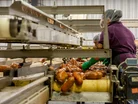Lloyds Bank: UK Food Manufacturing Outperformed In March

According to the latest Lloyds Bank UK Sector Tracker, UK food and drink manufacturers are outperforming all other sectors in both new order growth and output. The source of this success? The decision by food and drink manufacturers to cut consumer costs, despite seeing their own rise.
In March of this year, food and drink manufacturers continued a six-month streak of slashing prices. January was the only month when prices were reportedly raised, and even then, only marginally. This comes in contrast to the sizable increases to manufacturers own costs in April, a development which could impact future price-cutting plans. Reports of higher costs emerged as more manufacturing businesses- nearly four times the long-run average- experienced higher shipping-related expenses. Lloyds monitored fourteen UK sectors and found that nine saw output growth in March, a drop in one from February. Seven saw growing demand in the form of new orders, marking an increase from February. After food and drink manufacturing it was real estate that saw the fastest rate of activity growth and demand growth. This all reflects improving economic conditions and rising confidence from buyers about these sectors.
"Our latest report provides some tentative signs that UK manufacturing may be finally coming out of a challenging couple of years.” Nikesh Sawjani, Senior UK Economist, Lloyds Bank, said. “However, growth is largely concentrated in one or two areas – particularly food and drink – rather than spread across the whole sector with other parts continuing to be hit with declining demand. This suggests that manufacturing still has some way to go towards making a sustainable recovery.”
Indeed, the results of the Sector Tracker show that other areas of manufacturing are struggling to recover. Auto parts and automobile manufacturers saw their output drop sharply for the third month in a row, with metal and mining firms having demand fall at the fastest rate.
- A reading on the Tracker above 50.0 indicates expansion, while a reading below 50.0 indicates contraction.
- Of the 14 sectors monitored by the Tracker, food and drink manufacturers reported the fastest output growth in March (59.1 vs. 51.8 in February).
- This was driven by a strong rise in new orders (59.3 vs. 47.3), which was also the fastest of any sector recorded in March.
- Of the seven manufacturing sub-sectors monitored by the Tracker, only three – chemicals (56.9 vs. 50.4), food and drink manufacturing (59.1 vs. 51.8) and industrial goods manufacturing (50.8 vs. 53.9) – saw output grow.
“Of the sectors we monitor, food and drink manufacturing is the one that has most consistently cut prices over recent months.” Aled Patchett, Head of Retail and Consumer Goods, Lloyds Bank, said. “If this trend continues, this could help support the future growth of businesses that purchase wholesale food stocks, such as supermarkets, restaurants, pubs and hotels, and reduce costs for end-consumers.”
Aled recognises that while this trend has transformative potential it also has some drawbacks for manufacturers in a period with rising cost. “However, there’s renewed pressure on firms when it comes to their own input costs. As well as potentially forcing businesses to pause price-cutting, or even start to raise prices again, this will be putting an immediate squeeze on working capital.” Aled said. “ That’s something management teams across the sector will need to be closely tracking in order to minimise the impact and maintain their long-term resilience.”
Ultimately, the results of the latest Lloyds Bank UK Sector Tracker signals uncertainty for UK manufacturing, as broader factors like rising import and export costs continue to shape consumer and industry demand. Buyers respond when prices fall, like we’ve seen with food and drink, but maintaining this long-term depends on careful management of resources and labour in the manufacturing sector. While companies cannot necessarily anticipate economic trends, their leaders can invest in financial knowledge and critical business infrastructure. That way they can be strengthened against and prepared for any future economic downturns.
******
Make sure you check out the latest edition of Manufacturing Digital and also sign up to our global conference series - Procurement & Supply Chain 2024 & Sustainability LIVE 2024
******
Manufacturing Digital is a BizClik brand.
- JATCO now Producing Nissan EV Powertrains In the UKSustainability & ESG
- Britvic's Bold Bid to Cut Carbon and Costs in FactoriesSustainability & ESG
- Siemens, Sony & NVIDIA Unveil New Industrial AI Tools at CESAI & Automation
- Manufacturing Unwrapped: Inside IKEA, The Wonderful EverydayProduction & Operations


